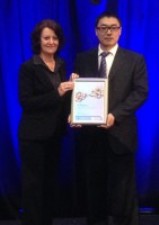Oct 10 2013
The rise of the digital age has revolutionised the way people generate, consume and store data in their daily lives.

Every year, government, businesses and individuals need to store more and more data, leading to ever-increasing demands for greater capacity in data storage devices.
To address this issue, Swinburne University of Technology researcher, Dr Xiangping Li, has been investigating nanophotonics techniques that show promise for ultra-high density all-optical magnetic recording.
Dr Li is an Australian Research Council Postdoctoral Fellow with the Centre for Micro-Photonics.
He is one of 12 young Victorian scientists to be awarded a prestigious Victoria Fellowship, announced on 8 October by the Minister for Innovation, Services and Small Business, Louise Asher, at Queen's Hall, Parliament.
The fellowship will fund the development of a cutting-edge nanophotonics technique to shrink the recording size of current magnetic storage, increasing the storage capacity to more than a Petabyte (1000 terabytes).
"The funding will allow me to visit the UK's York University - a pioneer in opto-magnetic storage techniques - for discussions on how to overcome the current technique bottlenecks," Dr Li said.
"I will also visit Imperial College in London to study practices in the forefront of nanoplasmonic technique to confine light and matter interaction at nanoscale."
The developed new technique will be tested in a pilot production line installed at Anwell Ltd in China, one of the world's largest disc manufacturers.
The project will develop new and existing international collaborations in nanomaterials, nanoplasmonics and information technology enterprises, which can further broaden international networks of the existing nanotechnology research environment including the Melbourne Centre for Nanofabrication, the Australian Synchrotron and MiniFab, and CSIRO.
The nanophotonics and nanoplasmonics knowledge and advanced skills for nanoscale magnetisation manipulation gained from outside Victoria will be passed on to colleagues and students working and studying at Swinburne.
The Victoria Fellowships, each worth $18,000, recognise young researchers with leadership potential to enhance their future careers, while developing new ideas that could offer commercial benefit to Victoria.
Dr Li has a Bachelor of Science in Applied Optics and a Master in Science at the Institute of Modern Optics from Nankai University, China. He completed his PhD thesis Nanoparticle-based multi-dimensional optical data storage at Swinburne in 2009.